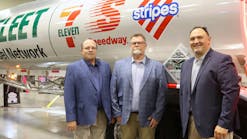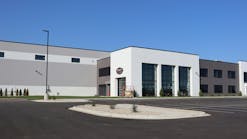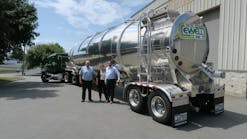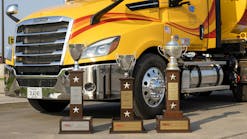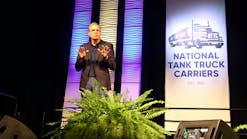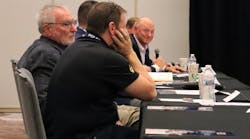Chairman’s Interview: In-depth Q&A with Florida Rock & Tank Lines president
Rob Sandlin was the right chair, at precisely the right time.
He joined Florida Rock & Tank Lines (FR&TL) as a management trainee in 1984, soon after graduating from the University of Tennessee, and worked his way to president and CEO of the for-hire carrier and its parent, Patriot Transportation Holding, so he was well equipped to lead National Tank Truck Carriers back from its pandemic low.
And as the leader of one of the few publicly traded tank truck entities, he’s accustomed to being accountable to additional stakeholders, so he was also well qualified to help NTTC sharpen its approach to serving members, and ideally suited to work with Washington on an apprenticeship program that benefits all of trucking.
Most importantly, he’s passionate about trucks—and dedicated to tankers.
“This association and this industry should be extremely thankful for the dedication, the time, and the work Chairman Sandlin has put in since he took on that position,” NTTC president and CEO Ryan Streblow attested.
NTTC’s 2021-22 chairman grew up around the oil business. His father started at Texaco and later worked for an oil distributor that ran a private fleet in Chattanooga, Tenn. One year removed from majoring in transportation logistics at Tennessee, he joined Florida Rock & Tank’s pricing department. While climbing the ranks, he spent 10 years in sales and operations, then moved to Jacksonville as a senior vice president in 1993.
Sandlin took over as FR&TL president in 2003, and added the Patriot CEO title five years ago.
“It’s a great company, and the Bakers (Patriot’s largest stakeholders) are great people to work for,” Sandlin said. “They hire you and let you go do your job. They have high expectations, as far as making money in this business, but it’s been good. It’s a public company, but it still feels like the rest of the tank truck carriers, a lot of which are family-owned businesses. So we try to maintain that culture as much as possible.”
FR&TL’s history dates to 1962, when the Baker family owned an aggregates and mining business called Florida Rock Industries. FR&TL spun off in 1986 with a mining real estate company, which spun off as FRP Holdings in 2015.
When Sandlin joined the company, its fleet was evenly split between dump trailers for hauling aggregates and tanks for petroleum. But the aggregate-hauling business started to deteriorate after deregulation, Sandlin said, so the company began growing its petroleum operation through acquisitions, with the largest the purchase of J.R. Mabbett & Sons, a petroleum transporter in Griffin, Ga., and its operating authority, in 1989.
“That’s how we got to where we are today,” Sandlin said.
Florida Rock & Tank now hauls petroleum and other liquid and dry bulk commodities across the Southeast, utilizing a fleet of more than 400 tractors and 500 trailers operating out of 21 terminals and a number of other domiciled locations.
Sandlin has been leading the way for nearly 20 years.
He helped FR&TL win NTTC’s top safety award in 2011, and chaired the Florida Trucking Association prior to becoming NTTC’s chairman. And he was gracious enough to speak with Bulk Transporter for our annual interview with the outgoing chairman before passing the mantle to Randy Clifford at the 2022 Annual Conference in San Diego, Calif.
Questions and answers are edited for length and clarity.
Bulk Transporter: Any opening thoughts on your year as NTTC chairman?
Rob Sandlin: “It’s been a good year. As we continue to transition our management team and establish how we want National Tank Truck Carriers to operate in the future, Ryan Streblow has done a great job, building the culture to operate more like any business, with a focus on our strategic priorities and member value. Ryan and Moira (Smith) work well as a team, so NTTC is in great shape.
“There have been critical trips to D.C. to talk about labor issues; I really enjoyed being around the Champion truck drivers, who are an important part of what we do; and by building relationships with the other NTTC leaders, and the owners of these businesses, we’ve put the organization back on a solid footing.”
BT: You’ve been active in trucking industry associations throughout your career. Why is it critical to be involved?
RS: “There are constantly new and lingering issues we have to deal with that are a challenge to our industry, and it takes industry leaders getting involved to make sure we’re improving the opportunities for all of us to be successful. It’s important for us to support the members of these organizations with various services and training, and safety recognitions, which are the basics of what we do.
“There are always challenges around the advocacy side, at the state and federal levels. At the federal level, thinking about National Tank Truck Carriers for instance, we’re dealing with labor shortage issues; and at the state level we’re dealing with lawsuit abuse, and trying to get reform done so there’s a more level playing field.
“Building relationships with government agencies—whether at the federal level, with the Federal Motor Carrier Safety Administration or Department of Labor, or the state level, with the Highway Patrol and DOT—is an important thing for us to do. I’ve enjoyed working with both FTA and NTTC, and I really believe that, through working together with management of these companies and organizations, we’ve made a difference in our ability to run our businesses more successfully.”
BT: Florida Gov. Ron DeSantis certainly took a different approach than many other state leaders to managing the pandemic and other key issues over the last several years. Are there unique challenges to operating in Florida?
RS: “Gov. DeSantis kept Florida open for business as much as possible during the pandemic, and for that we’re appreciative. But COVID certainly had a big impact on Florida. As an example, normally this time of year, we would have a lot of European travelers in the central and southern part of the state, and we haven’t seen that for obvious reasons. The other thing having an impact on the state of Florida is the fact that it’s a big port state, and so the supply-chain issues you hear about in California also are prevalent here. There’s a tremendous demand for truck drivers in Florida, and a lot of that’s being driven by the ports, and all the other reasons we have a shortage of truck drivers, but it’s particularly tough in these port cities. Truck drivers are just in very short supply. The other thing in Florida is we’ve got a tough litigation environment here. So we’re focused on lawsuit abuse reform, and trying to level the playing field. Florida’s a great state for business. We always profess to being one of the top five business environments. But we’re also historically one of the worst five for the litigation environment in the state, so I’m working hard, through FTA and ATA’s lawsuit abuse committees, to try to make a difference here.”
BT: What do you most appreciate about the tank truck industry’s trade association?
RS: “Having a tank truck organization allows us to focus specifically on the special nature of what we do. Tank truck carriers, both non-hazmat and hazmat, have a lot of unique characteristics that you don’t see in other parts of the trucking industry, and specific training requirements for our drivers, whether that’s a pneumatic trailer, a petroleum unit, or a hazardous chemical unit. We have to be the best of the best, as it relates to training and the execution of what we do. And so being a tank truck organization allows us to focus on those unique and special needs, and share ideas among management and safety personnel. Our safety group within NTTC is fantastic. And they do a great job of sharing best practices and ways we can all get better. And then the advocacy piece allows us to zero in on those things that impact the tank truck industry the most.”
BT: Is the association “back to normal” after a challenging couple of years due to the pandemic and changes in leadership?
RS: “National Tank Truck Carriers is back to what I would call our ‘new normal.’ We’re focused on running the organization more like a business, and our advocacy, training, and services. We’re also moving our offices (the week after the Annual Conference to 4300 Wilson Blvd. in Arlington, Va.). They’re going to be in a new, more open, collaborative space where we can work together to get things done for our membership. Our management staff, with Ryan and Moira’s leadership, did a great job during COVID, and this transition of leadership, and so the association, from operational and financial perspectives, is in great shape.”
BT: You’ve helped spearhead the push for registered driver apprenticeship programs, and FR&TL was one of the first carriers to commit to working with Washington on the issue. Why is this so important to you, and where are you in the process?
RS: “Sometimes you have to do something different to get different results. I had no idea what was involved with registered apprenticeships, but we jumped in for a couple of reasons. One, we need drivers, and if this is an avenue to gain quality employees, we need to be involved. And two, if Florida Rock & Tank Lines can be successful, then I, as chairman of National Tank Truck Carriers, have a responsibility to find out what it’s all about. And if NTTC can follow as a conduit to our members, that will be a win-win for everybody.
“I’ve enjoyed the process, and learned a lot about the inner workings of the DOL, DOT, and a little bit about how Washington works. Ryan and I were invited to a meeting at the White House with (Labor) Secretary (Marty) Walsh and (Transportation) Secretary (Pete) Buttigieg, and the financial advisor to the president, Brian Deese. And it was an honor to have a seat at the table for ourselves, and for National Tank Truck Carriers, and I believe we’re making headway.
“Florida Rock & Tank Lines has drivers, who are coming out of vocational schools and community colleges, employed as registered-apprenticeship employees on the non-hazardous side of our business right now. We also are working on a SkillBridge pilot program, which will give us a better opportunity to hire transitioning military personnel. Once that’s finalized, we’ll be on the SkillBridge website (skillbridge.osd.mil), which directly markets to military personnel.
“There are a couple of options coming through SkillBridge. One is to take military veterans with experience as truck drivers. If we can verify they have a minimum of one year of experience driving trucks in the military, we can hire those members and put them in a registered apprenticeship program, and they can become hazmat drivers. The other option is to take transitioning veterans and, while they’re still in the military, have them attend a community college or vocational school, get their training and CDL through a 300-hour course, and then come on with us as registered apprentices. That would primarily be for a non-hazardous materials job, like dry bulk or water.
“We’re also working with the Department of Labor and the Department of Defense to figure out what those documents will look like, and how we can make those documents, which prove drivers have verifiable tractor-trailer driving experience while in the military, more attainable, because today they’re not readily available.”
BT: What is the current state of the tank truck industry?
RS: “That question is hard to answer because mostly it’s a private or private equity-held business, so it’s difficult to gauge the real health of the industry because you don’t see any financials. We’re one of the few public companies. Driver wages have risen dramatically in the last year, and auto liability excess insurance premiums have increased dramatically, and at a rapid rate, the last several years. So it’s as difficult an operating environment as I’ve seen, with inflation, driver hiring, and insurance rates. Suffice it to say that tank truck carriers have had to increase their freight rates, hopefully to the point where they’re adding operating margin, because operating margins, depending on the segment of the business they’ve been in, have not been good in recent years. So I’m hopeful all of those things thrown together have put the industry in a better position to gain a reasonable return on investment.”
BT: It seems private-equity involvement is growing every year. Do you see that trend continuing?
RS: “I think you’ll continue to see private-equity expansion in our business. Frankly, it’s about the only way to grow a business right now. To grassroots grow a business, you have to be able to hire truck drivers, and I’ve always said growing in this business is done one driver at a time because we can’t grow revenue without drivers.
“There’s certainly a place for private equity in our industry. It’s historically been privately held, and I think it’ll continue to be a mix of privately held, smaller, regional companies, and private equity. There’s room for both. But this business is capital intensive, and depreciation, for all intents and purposes, is a real expense because you need that depreciation cash flow to re-fund your replacement capital on an annual basis. So there may be a time in the evolution of a lot of these companies, whether the owners are aging out or need additional capital, when they’re looking for a path forward, and private equity often is the answer.”
BT: Looking at NTTC’s regulatory efforts, it appears there was movement on streamlining TSA credentialing. Do you see that bill continuing to gain momentum and eventually being signed into law?
RS: “I certainly hope so. Our conversations with DOL, DOT, and FMCSA have all been about eliminating redundancy and duplication, while staying focused on our safety mission. For both us and those organizations, it’s a common-sense change. In Florida, we deal with HME and TWIC systems, and we’ve got one port that has their own petroleum driver identification card. So the more we can eliminate the redundancy of these things, so it doesn’t deter drivers from entering our industry, the better. So I believe something will get done. And we’re continuing to evaluate this new ELDT (entry-level driver training) requirement, which began in February, and providing feedback to DOT and DOL to be sure it doesn’t lead to delays in our ability to hire drivers.”
BT: The big news in March was rising fuel prices, due in part to the Russia-Ukraine conflict. How concerned are you at this point?
RS: “Like everyone else, we’re praying for the folks in Ukraine, and certainly the war has had an impact on our fuel prices. But frankly, they were increasing rapidly prior to the war. As far as the impact it could have on our industry, with diesel fuel prices, by and large we have fuel surcharges to help cover that additional cost. There are some delays on the way up and on the way down with pricing and those surcharges, so changes can have some short-term impact, both positive and negative, but over time, the surcharges should cover that cost. But the rapid increase in gasoline prices could have an impact on petroleum haulers, as people maybe make decisions not to travel. We’ve already seen airfares go up dramatically coming out of COVID, and with jet fuel prices going up, that probably is not going to get any better. So it could impact us from a consumer travel standpoint, with not quite as much demand through the summer season as we would normally see. And, really, its general inflation. When you think about tires, oil, parts, they’re all going up at dramatic rates, and the only way to cover those costs is to raise prices. There’s no other alternative.”
BT: We hear a lot about electric and autonomous trucks. Will either of those be realistic solutions for tank truck carriers anytime soon?
RS: “With electric vehicles, I don’t see a near-term impact on the tank truck segment, particularly for the short-haul segment. There may be some applications, but you have a big weight issue, because generally we’re filling the units up to where we’re already hauling maximum weights. And then a lot of petroleum carriers, as an example, shift their equipment, and run it two shifts a day. So when do you charge the unit up? How long does it take? So it’s going to be a while before electric vehicles really penetrate our segment. Same thing with autonomous vehicles. Somebody’s got to load and unload the fuel, or the cement, and typically our driver is doing that, so autonomous vehicles have a long way to go in our segment as well.”
BT: As for your legacy, what do you want people to remember most about your time as chairman?
RS: “Legacy may a strong word, but one of my goals was to help Ryan and his team establish and implement the business model for National Tank Truck Carriers going forward, and we’ve done that. They’ve done a very nice job. I didn’t realize when I took over that this labor shortage issue was going to shift our focus quite as much as it did, but I’m hopeful the work we’re doing with DOL, DOT, the White House and various organizations in Washington, will be something that stands the test of time, and benefits our industry. At the end of the day, we can have the greatest equipment in the world, but without a professional truck driver, we have absolutely nothing to sell.”
BT: Any words of wisdom for the incoming chairman?
RS: “The great thing about NTTC and the membership is that there are a lot of great leaders who are willing to give their time. Kevin (Jackson) did a great job last year, and Randy Clifford, who is coming in, will do a great job, too. And if you have the right management team in place, which I believe we do today, it makes the chairman’s job easy. So hopefully we’ve paved the way for Randy to have a smooth year.”


